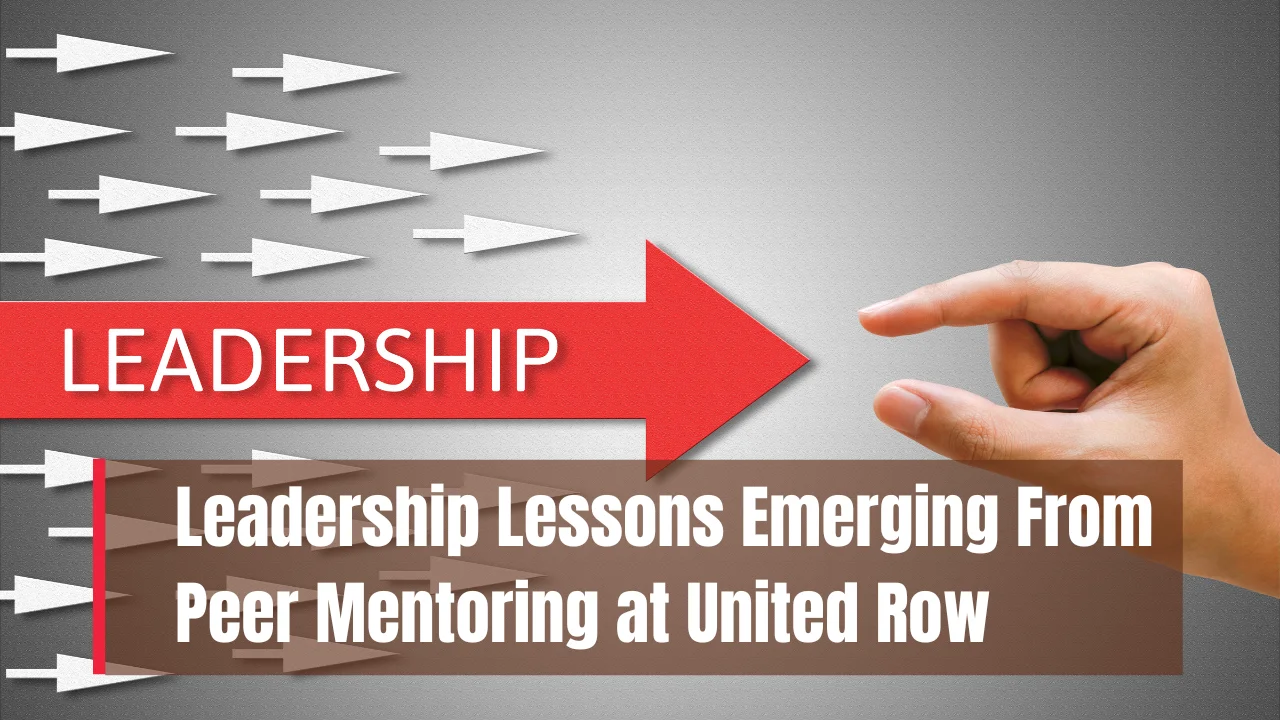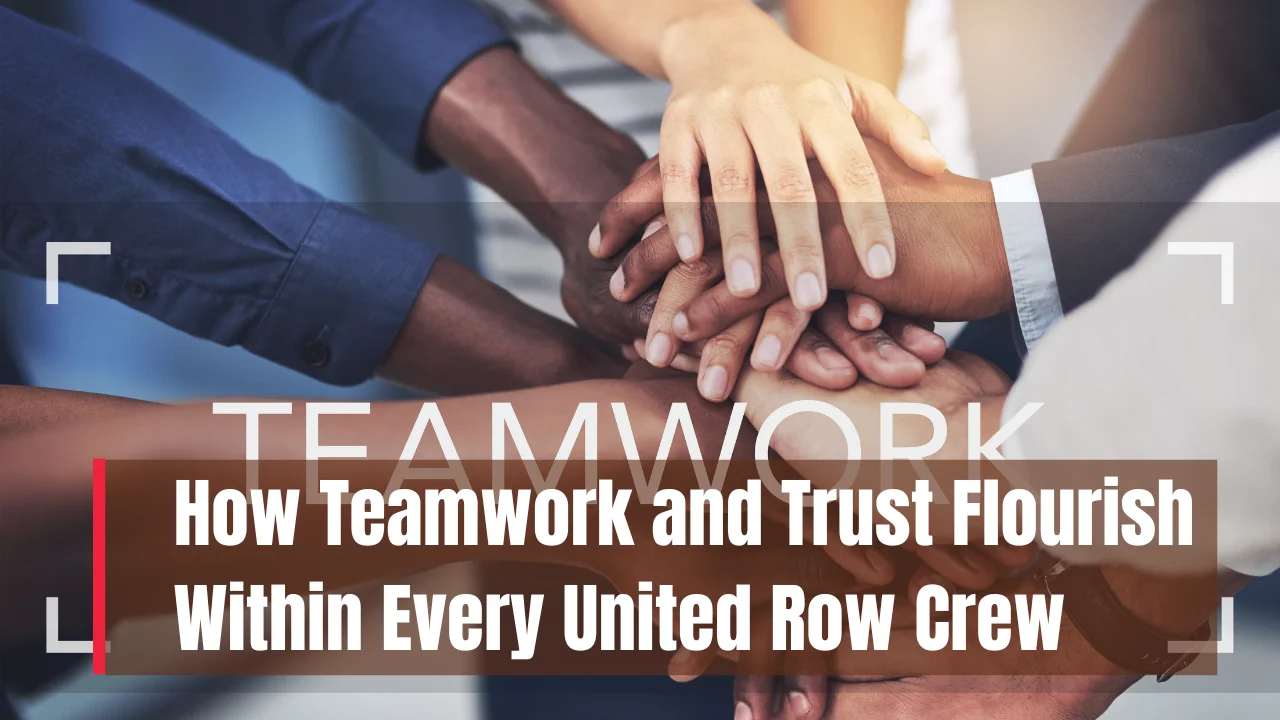Leadership Lessons: Leadership lessons are not always taught in formal settings. At United Row, a culture of peer mentoring is reshaping how leaders are made—through daily interactions, mutual support, and real-time problem-solving. In an environment where teamwork drives success, leadership is not assigned by title but earned through influence, insight, and trust.
This article explores how peer mentoring at United Row is cultivating authentic leadership by encouraging employees to step up, support one another, and lead by example. Whether you’re in a managerial role or just beginning your journey, the experiences at United Row provide a fresh, real-world take on leadership that evolves organically from within.
Leadership Lessons in Peer Mentoring at United Row
Peer mentoring at United Row serves as a practical framework where individuals learn to lead through trust, communication, and shared experiences. These leadership lessons are not theoretical—they are lived every day. Unlike top-down leadership training, peer mentoring fosters a collaborative space where everyone can be both a teacher and a learner. The result is a team that grows together, supports one another, and builds lasting leadership capabilities rooted in real challenges, not case studies.
Overview Table
| Key Aspect | Summary |
| Peer Mentoring Structure | Informal yet intentional knowledge-sharing system |
| Leadership Development Approach | Based on daily interactions and collaboration |
| Communication Focus | Emphasis on active listening and clarity |
| Emotional Intelligence | Developed through empathy and consistent feedback |
| Accountability Culture | Encourages ownership and self-discipline |
| Role of Mentors and Mentees | Both act as leaders and learners simultaneously |
| Team Collaboration Benefits | Strengthens unity and performance across departments |
| Long-Term Impact | Builds resilient, adaptive leaders for the future |
How Peer Mentoring Encourages Leadership Growth
At United Row, peer mentoring is not just about advice—it’s about developing a culture where leadership emerges from experience. Employees engage in guided conversations that encourage sharing insights, identifying strengths, and overcoming challenges together. This approach gives rise to leadership lessons that come from facing real workplace dynamics rather than hypothetical scenarios.
These mentoring relationships foster reflection, constructive feedback, and confidence-building. As peers help one another navigate daily tasks, they develop a deeper understanding of what leadership looks like in action. It’s not limited to a title but shown in behaviors, decisions, and interpersonal trust.
Building Communication Skills Through Mentorship
One of the most consistent leadership lessons developed through peer mentoring is effective communication. United Row places strong emphasis on open dialogue, which naturally enhances listening, clarity, and feedback delivery.
In mentoring sessions, peers learn to give feedback without criticism and listen without judgment. These skills translate directly into workplace leadership, where clarity of message, empathy, and responsiveness are critical. Over time, even employees who are naturally reserved become more articulate, persuasive, and emotionally aware—essential qualities for leading teams and managing people.
Encouraging Responsibility and Accountability
United Row’s peer mentoring structure reinforces personal accountability. Mentees are not given answers; they’re encouraged to find solutions. Mentors don’t impose decisions; they guide others to think critically. This intentional structure leads to one of the most important leadership lessons—taking ownership.
When individuals are trusted to make decisions and expected to follow through, they begin to internalize the values of discipline, responsibility, and independence. These are the foundational traits of sustainable leadership. It’s not about directing others; it’s about being dependable enough that others choose to follow your lead.
Key Leadership Lessons from Peer Mentoring
Here are two key leadership lessons that stand out from the peer mentoring model at United Row:
- Emotional Intelligence
Leaders need to manage both their own emotions and those of others. Through mentorship, individuals learn to interpret non-verbal cues, show empathy, and respond thoughtfully under pressure. These skills build healthier teams and foster trust. - Decision-Making
Peer mentoring encourages mentees to assess risks, weigh options, and make choices with confidence. Mentors offer a safe space for reflection, making it easier to learn from both successes and failures. This strengthens critical thinking and accountability in leadership roles.
Team Collaboration Improves Leadership Skills
Collaboration is at the heart of every successful leadership journey, and United Row leverages this in their mentoring structure. Instead of promoting individual competition, the organization encourages collective success. This results in leadership lessons rooted in team alignment, mutual respect, and shared goals.
Through regular mentoring discussions, employees learn how to delegate, support team members, and resolve conflicts. These practical skills improve not only workplace morale but also the overall quality of leadership across teams. It’s a model that values harmony as much as productivity.
Mentorship Builds Confidence in Future Leaders
Confidence doesn’t come from authority—it comes from experience and support. At United Row, mentorship creates a space where employees can safely take risks, ask questions, and make mistakes. This environment strengthens self-belief and resilience.
Mentors provide affirmation and challenge mentees to grow. Over time, this process turns hesitant contributors into confident decision-makers. These leadership lessons are internalized, not memorized, making them more likely to stick and influence behavior long-term.
Long-Term Impact of Peer Mentoring on Leadership
The results of peer mentoring aren’t just seen in quarterly reviews—they’re reflected in the long-term health of the organization. United Row’s leaders of tomorrow are being shaped today through consistent support and shared wisdom.
This system of development creates a sustainable leadership pipeline where people rise not because they were chosen, but because they earned the respect of their peers. It’s proof that leadership lessons learned in everyday settings can be just as powerful as formal training—if not more.
Final Thoughts
The leadership journey doesn’t have to begin with a title. As United Row demonstrates, peer mentoring can be the starting point for authentic, resilient leadership grounded in trust, empathy, and experience. When individuals are given space to grow, supported by peers who challenge and uplift them, true leaders naturally emerge.
If you’re aiming to grow as a leader or build leaders within your organization, consider adopting a peer mentoring approach. It’s practical, people-focused, and deeply effective. The most valuable leadership lessons aren’t delivered in lectures—they’re experienced in real conversations with those beside you.
Explore more leadership insights, and if this article resonated with you, don’t hesitate to share your thoughts or stories in the comments.
FAQs
The main goal is to help employees grow together by sharing knowledge, building trust, and developing leadership skills organically.
It allows individuals to learn through experience, gain feedback, and develop traits like empathy, communication, and responsibility.
Employees at all levels. Everyone can benefit from shared learning, whether new to the team or a seasoned professional.
Yes. It creates consistent growth through lived experience, helping future leaders develop skills that last.
Absolutely. Any company that values collaboration, trust, and employee development can benefit from a structured peer mentoring program.












